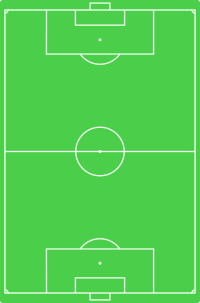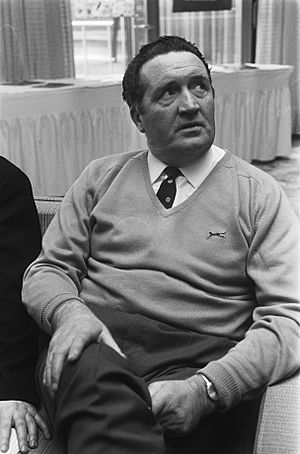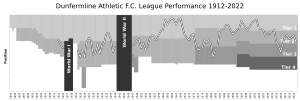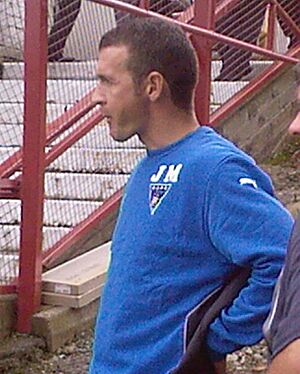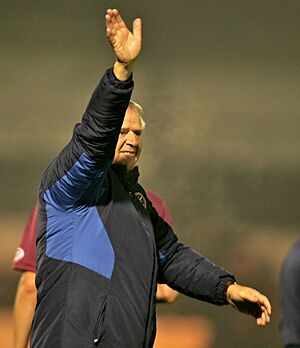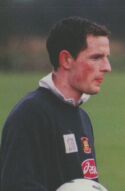History of Dunfermline Athletic F.C. facts for kids
Dunfermline Athletic F.C. is a Scottish football club based in Dunfermline. The club was started on 2 June 1885. They first joined the Scottish Football League in 1912, playing in the second division. Dunfermline Athletic, often called "the Pars," moved up to the top division of Scottish football for the first time in 1926. However, for their first forty years, they mostly played in the second tier.
The club's most successful time was in the 1960s. This was thanks to two great managers: Jock Stein (1960–1964) and George Farm (1967–1970). Jock Stein, who later became famous for managing Celtic, led the Pars to their first Scottish Cup win in 1961. He also brought European football to East End Park, with Dunfermline playing their first European game in 1961. George Farm continued this success, leading the Pars in more European matches and to their most recent Scottish Cup win in 1968.
Even though they haven't had the same level of success since the 1960s, the club has still competed for trophies in Scottish football. They reached the final of the 2006 Scottish League Cup Final and the Scottish Cup finals in 2004 and 2007.
The Club's Early Days
How Dunfermline Athletic Started (1874–1899)
The first football club in Dunfermline was formed in 1874. It was created by members of the Dunfermline Cricket Club who wanted to stay fit during winter. However, a disagreement about who could join the club led some members to leave. These members then formed Dunfermline Athletic Football Club on 2 June 1885.
Dunfermline Athletic quickly became the main football club in the town. For their first 25 years, they played as an amateur team. This means players were not paid. They became a professional club in 1899, meaning players started to get paid for playing.
The Twentieth Century Journey
Early Years and World War I (1900–1959)
After playing in smaller local and national cups, Dunfermline joined the Scottish Football League in 1912. They played in the Scottish Division Two. During World War I, the second tier league was stopped. When it didn't restart in 1919, Dunfermline joined a new league called the 'Central Football League'. This league allowed them to attract some top players because it had different wage rules than the SFL. One famous player was Andy Wilson, who played for Scotland while with the club.
In 1921, the Central League and its clubs joined the SFL. The years leading up to World War II were not very successful for the club. They mostly played in the second tier, with only a few seasons in the top flight.
In 1950, Bobby Ancell was offered the manager's job but turned it down because of problems with the club's board. Two seasons later, with a new board in place, Ancell accepted the job. He steadily improved the team, and in 1955, he led them back to the top division. He then left to manage Motherwell.
The Golden Age of Success (1960–1969)
The club's best decade began when Jock Stein became manager in 1960. Dunfermline regularly played in European football competitions like the UEFA Cup and European Cup Winners' Cup throughout the 1960s.
Under Stein, Dunfermline won the Scottish Cup in the 1960–61 season. They beat Celtic 2–0 in the final after a replay. In 1962, they reached the quarter-finals of the Cup-Winners Cup. They lost to Újpest Dózsa SC from Hungary. On their way, they beat teams like St Patrick's Athletic and FK Vardar. In the 1962–63 season, Dunfermline beat Everton in the Fairs Cup. They then played Valencia, losing away but winning at home. Dunfermline lost a deciding play-off game. Jock Stein left in 1964 to join Hibernian.
New manager Willie Cunningham led the club to the Scottish Cup final in the 1964–65 season. They lost 3–2 to a Celtic team that was just starting its successful era under Jock Stein. The Pars finished 3rd in the league that year. The next year, Cunningham took Dunfermline to the quarter-finals of the Inter-Cities Fairs Cup. Famous manager Alex Ferguson was a player for Dunfermline between 1964 and 1967.
George Farm managed the club from 1967 to 1970. He also won the Scottish Cup in 1968, beating Hearts 3–1 in the final. Farm then achieved the club's biggest success to date. He led them to the semi-final of the European Cup Winners' Cup in the 1968–69 season. They lost 2–1 to Slovan Bratislava, who went on to win the competition. On their way to the semi-final, Dunfermline beat teams like APOEL, Olympiacos, and West Bromwich Albion.
Moving Down the Leagues (1970–1993)
After their golden age, Dunfermline's performance declined. In the 1980s, the team often struggled. They had periods of losing many games in a row. This sometimes put them in danger of being relegated to an even lower division.
In the 1981–82 season, they improved a little, finishing in mid-table. A key player during this time was Norrie McCathie, who joined from Cowdenbeath. He went on to play a club record 497 league games before his sad death in 1996.
The 1982–83 season was very difficult, and the team was near the bottom of the league for most of the time. Manager Pat Stanton left, and Tom Forsyth took over. The team struggled to score goals, and relegation to a lower division became unavoidable.
A new manager, Jim Leishman, took over in 1983. He had played for Dunfermline as a young man. The team still struggled at first, but Leishman signed some good players. The 1983–84 season ended with them finishing 9th in Division 2.
The 1984–85 season started very well, with six straight wins putting the Pars at the top of the league. However, they then had a difficult period. They finished third in the league. To celebrate the club's 100th birthday, a special game was played against Aberdeen, which Dunfermline won 1–0.
In the 1985–86 season, Dunfermline had a long unbeaten run from September to January. They scored many goals, including six against Albion Rovers. Despite some tough games at the end of the season, Dunfermline finished second in the league. This meant they were promoted from the third tier to the second tier of Scottish football. John Watson was the top scorer with 24 goals.
The 1986–87 season started strongly, with Dunfermline winning their first four games and reaching the top of the league. They managed to stay near the top for most of the season. Although they lost some games towards the end, they finished second again. This meant they were promoted for the second year in a row, reaching Scotland's top division for the 1987–88 season. Norrie McCathie was the only player to play in every game that season.
In the 1987–88 season, Dunfermline achieved a famous victory. They knocked Rangers, who were managed by Graeme Souness, out of the Scottish Cup with a 2–0 home win. However, the league season was tough. They struggled to win games and used many different players and even five different goalkeepers. Dunfermline was relegated back to the First Division at the end of the season.
The Bert Paton Era (1993–1999)
The 1995–96 season was a mix of triumph and sadness. Dunfermline won the Scottish First Division championship, which meant they were automatically promoted to the Scottish Premier Division. However, it was also the season when the club's captain and a truly great player, Norrie McCathie, sadly passed away at the age of 34.
The team remained in the Scottish Premier League until 1999, when they were briefly relegated to the Scottish First Division for one season.
East End Park, which had been the Pars' home ground since 1885, was updated during this time. It became an all-seater stadium with space for 12,509 fans. The West stand was renamed the Norrie McCathie stand in honor of their late captain.
The Twenty-First Century
Time in the Scottish Premier League (2000–2007)
Dunfermline spent seven years in the Scottish Premier League, with mixed results. In the 2002–03 season, they finished 5th, which was their highest position yet. The next season, they did even better, finishing fourth. They also reached the 2004 Scottish Cup Final, which meant they qualified for the UEFA Cup.
After this period of success, manager Jimmy Calderwood and his assistant left to join Aberdeen. This led to a decline in the club's fortunes. In 2004–2005, the team ended up in the lower half of the SPL, and the new manager was sacked. Jim Leishman returned as manager for a second time and helped the team avoid relegation in the last three games of the season.
The 2005–06 season was another difficult one. They suffered a big 8–1 home defeat to Celtic. However, the Pars also reached the final of the League Cup that season, losing 3–0 to Celtic.
The 2006–07 season started badly. Leishman returned to his role as Director of Football, and Stephen Kenny became the new manager in October 2006. But he couldn't improve the club's results.
Dunfermline was relegated from the Scottish Premier League on 12 May 2007 after losing 2–1 to Inverness Caledonian Thistle. Despite this, Dunfermline reached their third major final in four years, losing the 2007 Scottish Cup Final to Celtic on 27 May. Because Celtic had already qualified for Europe by winning the SPL, Dunfermline was able to play in the 2007–08 UEFA Cup. This meant they were relegated from the league but still qualified for European competition in the same season!
Back in the First Division (2007–2011)
After being relegated to the First Division, Dunfermline lost some key players. They also played a friendly match against a Manchester United team. Their first UEFA Cup match since 2004 was against a Swedish team, BK Häcken, which they drew at home but lost away, meaning they were knocked out.
Dunfermline continued to struggle at the start of the season. It took them four games to get their first win in the second tier. However, they did reach the final of the Challenge Cup, but lost 3–2 to St Johnstone.
After a year in charge, Stephen Kenny's team was near the bottom of the First Division. He was sacked in December 2007. Striker Jim McIntyre took over as temporary manager. After going six games without a loss, McIntyre was given the manager's job full-time in January 2008. The team improved under him, finishing 5th in the league.
In the following season, Dunfermline started well but couldn't challenge for promotion. They finished third in the league. The next season was similar, with a slow start but a strong finish. They again finished third, missing out on promotion.
SPL, Relegation, and Financial Challenges (2011–2013)
The next season was much better. Dunfermline was at the top of the league after six games and stayed in the top two for most of the season. They were very strong away from home. After a big win against their rivals Raith Rovers, Dunfermline won the 2010–2011 First Division championship. This meant they were promoted back to the Scottish Premier League. They finished the season with a twelve-game unbeaten run and six wins in a row.
However, their return to the SPL was difficult. In March 2012, with Dunfermline at the bottom of the league and without a home win all season, manager Jim McIntyre was sacked. Jim Jefferies took over. Dunfermline got their first home win of the season in April, but on 7 May 2012, they were relegated from the SPL after a 4–0 defeat to Hibernian.
The 2012–13 season in the Scottish First Division started well, with 6 wins from their first 7 games. However, the club soon faced serious financial problems. Players were not paid on time, and there were reports of unpaid tax bills. In March 2013, the club announced it was going into a process called "voluntary administration." This is when a company gets help to manage its debts.
As a result, eight players were let go, and the manager's salary was reduced. The Scottish Football Association also punished the club by taking away 15 points. This point deduction meant the club was pulled into a fight to avoid relegation. On the last day of the season, they lost and finished in a play-off position. They then lost the play-off final and were relegated again, this time to the third tier of Scottish football.
Time in Scottish League One (2013–2016)
After being relegated, the club found themselves in Scottish League One (which used to be called the Scottish Second Division). The 2013–14 season started well, and they finished second in the league, behind Rangers. They then entered the play-offs to try and get promoted. They beat Stranraer in the semi-final, setting up a final against local rivals Cowdenbeath. The first game was a 1–1 draw. However, in the second game at East End Park, Dunfermline lost 4–0. This meant they would stay in Scottish League One for another season.
The 2014–15 season also started well, with the Pars topping the table after nine matches. But by December, they had dropped to fifth place. On 16 December 2014, manager Jim Jefferies resigned. The club finished seventh that season. In May 2015, Allan Johnston was appointed as the new manager.
In the 2015–16 season, Johnston made many changes to the squad. The team started the season with some amazing wins, scoring many goals. They stayed at the top of the league for the rest of the season. On 26 March 2016, Dunfermline were confirmed as champions of the league after a 3–1 victory. This ended their three-year stay in the third tier and meant they were promoted back to the Scottish Championship.
Back in the Scottish Championship (2016–)
The 2016–17 season began in July 2016. Dunfermline started their Scottish Championship season with a 4–3 win against Dumbarton. After this, they had a difficult period, but their performance improved between November and February. They finished 6th in the league.
The club has continued to compete in the Scottish Championship in recent seasons.
 | Aurelia Browder |
 | Nannie Helen Burroughs |
 | Michelle Alexander |


